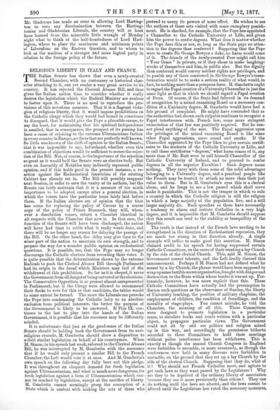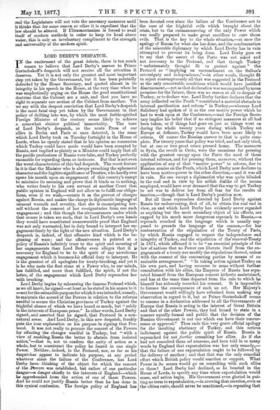RELIGIOUS LIBERTY IN ITALY AND FRANCE.
Italian Senate has shown that even a newly-created ITff Second Chamber, with no customary or historical chpr- acter attaching to it, can yet render a very great service to its country. It has rejected the Clerical Abuses Bill, and thus given the Italian nation time to consider whether it really desires the legislation which the Radical Ministry are anxious to fasten upon it. There is no need to reproduce the pro- visions of this notorious measure. That it is a flagrant viola- gion of religious liberty, that it would impose prohibitions on the Catholic clergy which they would feel bound in conscience to disregard, that it would give the Pope a plausible excuse, to say the least, for maintaining that his spiritual independence is assailed, that in consequence, the prospect of its passing has been a cause of rejoicing to the extreme Ultramontane faction in every country in Europe, are facts that are perfectly well known. So little was known of the drift of opinion in the Italian Senate, that it was impossible to say, beforehand, whether even this combination of objections would be sufficient to secure the rejec- tion of the Bill. Nor, of course, is the importance of the rejection so great as it would be if the Senate were an elective body. But even an Assembly of Notables may indirectly represent public opinion, and if this holds good in the present instance, a re- action against the Ecclesiastical fanaticism of the existing Cabinet has already set in. The Bill will possibly reappear next Session, in order to save the vanity of its authors, but the Senate can fairly maintain that it is a measure of too much importance to be adopted except after a general election, in which the voters have the particular issue fairly laid before them. If the Italian electors are of opinion that the time has come for replacing the policy of Cavour by a coarse copy of the policy of Prince Bismarck, they will, when- ever a dissolution comes, return a Chamber identical in all respects with the Chamber that now is. In that case, the function of the Senate will have been discharged, the nation will have had time to settle what it really wants done, and there will be no longer any reason for delaying the passage of the Bill. On the other hand, the delay may give time to the wiser part of the nation to ascertain its own strength, and to prepare the way for a sounder public opinion on ecclesiastical questions. It is possible, too, that the Pope' may no longer discourage the Catholic electors from recording their votes. It is quite possible that the determination shown by the extreme Radicals to push the Clerical Abuses Bill through Parliament had its origin in the dread which Ministers may feel of the withdrawal of this prohibition. So far as it is obeyed, it saves the Government from all danger of being outvoted at the elections. The Conservative Opposition is at present almost unrepresented in Parliament, but if the Clergy were allowed to recommend their flocks to vote for this or that candidate, the tables would to some extent be turned. The more the Liberals can provoke the Pope into condemning the Catholic laity to an absolute exclusion from political interests, the better the purpose of the Government is likely to be answered. If Pius IX. con- tinues to the last to play into the hands of the Italian Government, it is possible that his successor may be differently minded.
It is unfortunate that just as the good-sense of the Italian
Senate should be holding back the Government from its anti- religious crusade, M. Gambetta should show a disposition to solicit similar legislation on behalf of his countrymen. When M. Simon, in his speech last week, referred to the Clerical Abuses Bill, he was interrupted by M. Gambetta with the assurance that if he would only present a similar Bill to the French Chamber, the Left would vote it at once. And M. Gambetta's own speech on the following day fully bore out this pledge. It was throughout an eloquent demand for fresh legislation against Ultramontanism, and what is much more dangerous, for fresh legislation against a form of Ultramontanism which can- not be reached by legislation, except at the sacrifice of liberty. M. Gambetta cannot seemingly grasp the conception of a State which is content with making the acts of those who pretend to usurp its powers of none effect. He wishes to see the authors of these acts visited with some exemplary puniah- ment. He is shocked, for example, that the Pope has appointed. a Chancellor to the Catholic University at Lille, and given him the power to confer degrees. What does it matter whether the Pope does this or not, so long as the State pays no atten- tion to the degrees thus conferred I Supposing that the Pope were to create Sir George Bowyer a duke, no harm would come of it. The friends of the newly-created Peer might call him " Your Grace " in private, or if they chose to make laughing- stocks of themselves and him, in public also. But the dignity thus conferred would convey neither rights nor privileges, and to punish any of those concerned in Sir George Bowyer's trans- formation would be to make a serious reality of what would, in fact, be nothing more than a pompous farce. M. Gambetta ought to regard the Papal creation of a University Chancellor in just the same light as that in which we should regard a Papal creation of Peers. Of course, if the State had faltered in its demand of recognition by a mixed examining Board as a necessary con- dition of a University degree, M. Gambetta would have had a fair ground of complaint. He might have contended that as the authorities had shown such culpable readiness to recognise a Papal interference with French law, some more stringent enunciation of that law was positively required. But he can- not plead anything of the sort. The Papal aggression upon the privileges of the mixed examining Board is like some other Papal aggressions, mere sound and smoke. If the Chancellor appointed by the Pope likes to give certain certifi- cates to the students of the Catholic University at Lille, and to call these certificates " degrees," what harm comes of it, any more than if Mr. Butt were to call himself Chancellor of the Catholic University of Ireland, and to proceed to confer degrees in all the superior Faculties ? Such degrees mean nothing. They carry with them none of the solid advantages belonging to a University degree, and a practical people like the French may be trusted to attach no more than their just value to them. But in M. Gambetta's eyes this is a clerical abuse, and he longs to see a law passed which shall serve make it punishable. This is not the temper in which to rule a country in which the Catholic religion is still the religion in which a large majority of the population live, and a still larger majority die. Such speeches as these have necessarily a tendency to alarm and irritate Catholics in a very high degree, and it is impossible that M. Gambetta should suppose that this result can tend to the stability or tranquillity of the Republic.
The truth is that instead of the French laws needing to be strengthened in the direction of Ecclesiastical repression, they are much too strong in that direction already. A single example will suffice to make good this assertion. M. Simon claimed credit in his speech for having suppressed certain Catholic Committees, on the score of their creating a lay Church by the side of the clerical Church. This, said M. Simon, the Government cannot tolerate, and the Left loudly cheered this announcement. Perhaps if M. Simon had not defined what he meant by a lay Church, the phrase would have been supposed to wrap up some terrible secret organisation, fraught with danger and destruction to the State within whose border it was set up. For- tunately, however, he was more explicit than this. These Catholic Committees have actually had the presumption to discuss such questions as the observance of Sunday, the liberty of University teaching, the position of military chaplains, the employment of children, the condition of foundlings, and the morality of stage-plays. You cannot mistake, he told the Chamber, the meaning of all this. These Committees were designed to promote legislation in a particular sense, to circulate books and tracts written with a particular object, to propagate particular views. The Government could not sit by and see politics and religion mixed up in this way, and accordingly the permission hitherto accorded to these Committees to hold their meetings without police interference has been withdrawn. This is exactly as though the annual Church Congress in England were forbidden to assemble, or more accurately, as though the conferences now held in many dioceses were forbidden to assemble, on the ground that they set up a lay Church by the side of the clerical Church. Supposing that they do, what of it ? Why should not French Catholics meet, and agitate to get such laws as they want passed by the Legislature ? Why are they to be deprived of the ordinary liberty of association because they use it more persistently than others V They can do nothing until the laws are altered, and the laws cannot be altered until the Legislature has voted the necessary measures, and the Legislature will not vote the necessary measures until it thinks that for some reason or other it is expedient that the law should be altered. If ITItranumtanism is forced to avail itself of modern methods in osier to keep its head above water, this is only an involuntary compliment to the strength. and ,universality of the modern ,pint.



































 Previous page
Previous page